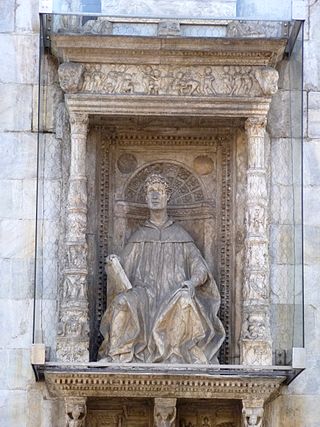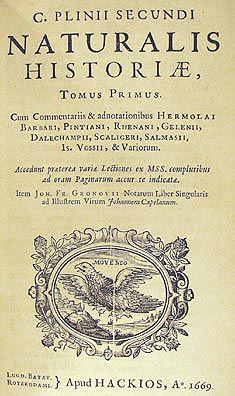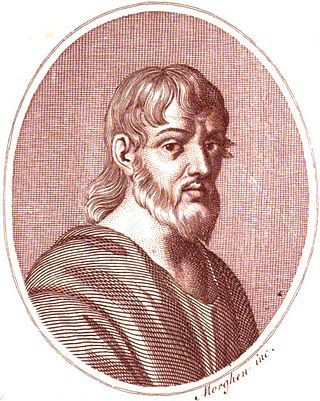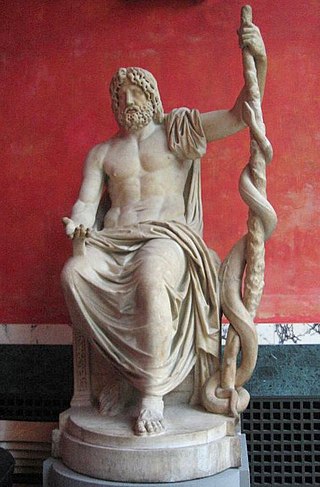Related Research Articles

Gaius Plinius Secundus, called Pliny the Elder, was a Roman author, naturalist, natural philosopher, and naval and army commander of the early Roman Empire, and a friend of the emperor Vespasian. He wrote the encyclopedic Naturalis Historia, which became an editorial model for encyclopedias. He spent most of his spare time studying, writing, and investigating natural and geographic phenomena in the field.

Gaius Plinius Caecilius Secundus, born Gaius Caecilius or Gaius Caecilius Cilo, better known as Pliny the Younger, was a lawyer, author, and magistrate of Ancient Rome. Pliny's uncle, Pliny the Elder, helped raise and educate him.

The Natural History is a work by Pliny the Elder. The largest single work to have survived from the Roman Empire to the modern day, the Natural History compiles information gleaned from other ancient authors. Despite the work's title, its subject area is not limited to what is today understood by natural history; Pliny himself defines his scope as "the natural world, or life". It is encyclopedic in scope, but its structure is not like that of a modern encyclopedia. It is the only work by Pliny to have survived, and the last that he published. He published the first 10 books in AD 77, but had not made a final revision of the remainder at the time of his death during the AD 79 eruption of Vesuvius. The rest was published posthumously by Pliny's nephew, Pliny the Younger.

Juba II or Juba of Mauretania was the son of Juba I and client king of Numidia and Mauretania. Aside from his very successful reign, he was a highly respected scholar and author. His first wife was Cleopatra Selene II, daughter of Queen Cleopatra VII of Ptolemaic Egypt and Roman Triumvir Mark Antony.

Arria was a woman in ancient Rome. Her husband, Caecina Paetus, was ordered by the emperor Claudius to commit suicide for his part in a rebellion but was not capable of forcing himself to do so. Arria wrenched the dagger from him and stabbed herself, then returned it to her husband, telling him that it didn't hurt. Her story was recorded in the letters of Pliny the Younger, who obtained his information from Arria's granddaughter, Fannia.

Asclepiades, sometimes called Asclepiades of Bithynia or Asclepiades of Prusa, was a Greek physician born at Prusias-on-Sea in Bithynia in Anatolia and who flourished at Rome, where he practised and taught Greek medicine. He attempted to build a new theory of disease, based on the flow of atoms through pores in the body. His treatments sought to restore harmony through the use of diet, exercise, and bathing.

Acron, son of Xenon, was a Greek physician born at Agrigentum.

The Medical community as used in this article refers to medical institutions and services offered to populations under the jurisdiction of the late Roman Republic and the Roman Empire. The Medical services of the Roman Republic and the early Roman Empire were adopted from ancient Greece. It was first imported from Greece through Greek colonies in Magna Graecia and the Etruscan civilization. After the Roman conquest of Greece, enslaved Greeks brought more Greek medical knowledge to Rome. In 219 BCE a surgeon named Archagathus traveled from the Peloponnesus to Rome. He became a citizen and purchased a taberna near a crossroads. This became the first officina medica. Previously, the pater familias was responsible for the medical art in early Rome. Physicians in ancient Rome would take the Hippocratic Oath. Doctors would begin their appointments with patients by stating "si vales valeo," which translated to "if you are well I am well." Physicians were often wealthy. Augustus' physician, Antonius Musa, received a salary of 30,000 sesterces. Doctors would also serve in the Roman military and treat injured soldiers.
Albucius or Albutius was a physician of ancient Rome, who lived probably about the beginning or middle of the 1st century, and who is mentioned by Pliny as having gained by his practice the annual income of two hundred and fifty thousand sesterces. This is considered by Pliny to be a very large sum, and may therefore give us some notion of the fortunes made by physicians at Rome about the beginning of the empire.
The name Alcon or Alco can refer to a number of people from classical history:
Cameria or Camerium was an ancient city of Latium, which according to tradition was conquered by Rome in the time of the Kings, and destroyed following a revolt against Roman authority in 502 BC. Its inhabitants were known as Camerini.

The gens Vibia was a plebeian family at ancient Rome. Although individuals named Vibius appear in history during the time of the Second Punic War, no members of this gens are found at Rome until the final century of the Republic. The first of the Vibii to obtain the consulship was Gaius Vibius Pansa in 43 BC, and from then until imperial times the Vibii regularly filled the highest offices of the Roman state. The emperors Trebonianus Gallus and Volusianus each claimed descent from the family.
The gens Arellia was a plebeian family at Rome. Although of equestrian rank, this gens does not appear to have been particularly large or important, and is known primarily from three individuals.
The gens Arruntia was a plebeian family at ancient Rome. Members of this gens first came to prominence during the final years of the Republic.

Grape syrup is a condiment made with concentrated grape juice. It is thick and sweet because of its high ratio of sugar to water. Grape syrup is made by boiling grapes, removing their skins, squeezing them through a sieve to extract the juice. Like other fruit syrups, a common use of grape syrup is as a topping to sweet cakes, such as pancakes or waffles.
Antonius Castor was a pioneering botanist and pharmacologist of ancient Rome who lived in the first century. He is several times quoted and mentioned by Pliny the Elder, who considered him the greatest authority on his subjects.
Gaius Catellius Celer was a Roman senator who flourished during the Flavian dynasty. He served as suffect consul for the nundinium September-October 77 with Marcus Arruntius Aquila as his colleague.
Marcus Arruntius Aquila was a Roman senator who flourished during the Principate. He held the office of suffect consul in 66 with Marcus Vettius Bolanus as his colleague. His name in the Acta Arvalia is missing the cognomen, which Giuseppe Camodeca reconstructed from an unpublished wax tablet from Herculeium.
Archagathus, a Peloponnesian, the son of Lysanias, who settled at Rome as a practitioner of medicine around 219 BCE, and, according to Lucius Cassius Hemina, was the first person who made it a distinct profession in that city. He was received in the first instance with great respect, he was accorded the Jus Quiritium – that is, the privileges of a free native of Rome – and a shop was bought for him at the public expense; but his practice was observed to be so severe, that he soon excited the dislike of the people at large and produced a complete disgust to the profession generally. In return for the favors he received from the Romans, he purged, bled, hacked, and cauterized them to such a degree, that at length they refused to tolerate such rough treatment any longer, and the commonwealth was purged of Archagathus himself.

Crinas (Crinias) of Marseilles was a 1st-century physician from Massilia (Marseilles), contemporary of the Emperor Nero. He practiced medicine in Massilia, having mathematical and astrological knowledge. What we know about him comes from a few lines of Pliny the Elder in his Natural History, book XXIX, 5 (9).
References
- ↑ Pliny the Elder, Natural History 29.5)
![]() This article incorporates text from a publication now in the public domain : Greenhill, William Alexander (1870). "Arruntius". In Smith, William (ed.). Dictionary of Greek and Roman Biography and Mythology . Vol. 1. p. 353.
This article incorporates text from a publication now in the public domain : Greenhill, William Alexander (1870). "Arruntius". In Smith, William (ed.). Dictionary of Greek and Roman Biography and Mythology . Vol. 1. p. 353.